Recent Posts
Allergy Proof Your Home
3/27/2024 (Permalink)
 Are allergies making your life miserable?
Are allergies making your life miserable?
As the seasons change, so do the challenges homeowners face. One of the most prevalent issues during spring and summer is the onslaught of pollen and seasonal allergies. While many people focus on protecting themselves from outdoor allergens, it's equally important to safeguard your home against these invaders. At SERVPRO of Upper Bucks, we understand the importance of maintaining a healthy indoor environment. Here are some steps you can take to defend your home against seasonal allergies
Understanding Seasonal Allergies:
Seasonal allergies, often triggered by pollen from trees, grasses, and weeds, can wreak havoc on your health and quality of life. Symptoms such as sneezing, congestion, itchy eyes, and fatigue can make it difficult to enjoy the beauty of spring and summer. However, by implementing preventive measures, you can create a sanctuary within your home where you can breathe easy.
Sealing Your Home:
One of the first lines of defense against pollen infiltration is to seal your home effectively. Inspect doors and windows for any gaps or cracks that may allow pollen to enter. Replace worn weather stripping and apply caulking where necessary to create a tight seal. Additionally, consider installing pollen-resistant screens on windows to filter out airborne allergens while still allowing fresh air to circulate.
Maintaining Cleanliness:
Regular cleaning is essential for keeping allergens at bay. Dust and vacuum your home frequently, paying special attention to areas where pollen may accumulate, such as carpets, rugs, and upholstery. Use a vacuum cleaner equipped with a HEPA filter to trap even the smallest particles. Wash bedding, curtains, and other fabrics regularly in hot water to remove pollen and other allergens. At SERVPRO of Upper Bucks, our professional cleaning services can provide a thorough and efficient solution to ensure your home remains free of allergens.
Filtering Indoor Air:
Investing in a high-quality air purifier can significantly improve indoor air quality by capturing pollen, dust, and other airborne particles. Choose an air purifier with a HEPA filter and consider placing it in frequently used rooms for maximum effectiveness. Additionally, regularly replace the filters in your HVAC system to prevent pollen from circulating throughout your home.
Professional Restoration Services:
In addition to these preventive measures, sometimes unforeseen circumstances such as water damage or mold growth can exacerbate indoor allergen issues. That's where SERVPRO®of Upper Bucks comes in. Our team of trained professionals specializes in water damage restoration, mold remediation, and indoor air quality improvement. Whether you're dealing with a flooded basement or a persistent mold problem, we have the expertise and resources to restore your home to its pre-damage condition quickly and efficiently.
As allergy season approaches, taking proactive steps to safeguard your home against pollen and other allergens is essential for maintaining a healthy indoor environment. By sealing your home, maintaining cleanliness, filtering indoor air, and utilizing professional restoration services when needed, you can create a haven where you can breathe easy and enjoy the beauty of spring and summer. At SERVPRO of Upper Bucks, we're here to support you every step of the way on your journey to a healthier home.
6 Ways to Love Your Home
2/20/2024 (Permalink)
 People aren't the only ones who deserve love!
People aren't the only ones who deserve love!
People aren’t the only ones who deserve love this time of year. Why not shower some love on the place you spend so much of your time? Neglecting home maintenance can increase your chance of costly fire, water, or mold damage. Here are 6 ways to be kind to your home and in return your bank account as well!
1. Empty dryer vents- Lint accumulation in dryer vents decreases machine efficiency and most importantly poses a major fire hazard. If you’re seeking professional services in this area don’t forget SERVPRO® of Upper Bucks offers air duct and HVAC cleanings.
2. Inspect Sump Pump- Your sump pump is what stops built-up rainwater and heavy rain from ruining your basement by moving it away from the foundation of your house. There are many different methods you can use to test your sump pump, we suggest checking both the pump’s power and functionality by slowly pouring a 5-gallon bucket of water into the sump pump pit and looking to see if the float of the pup is rising and then once the water is pumped watch and listen to see if the pump has successfully turned itself off.
3. Clean Gutters- Clogged gutters and downspouts can lead to water damage and other serious structural problems. It’s recommended to clean your gutters at least twice per year to maintain proper drainage and prevent potential damage
4. Protect Pipes- Maintaining a thermostat setting of 65º or above helps prevent pipes from freezing. Insulating exposed pipes located in unheated areas like your attic, crawl space, or garage can further safeguard against cold temperatures and potential bursts.
5. Enhance Airflow- It’s safe to presume that where air isn’t flowing, mold is growing! Open doors between rooms, and leave closet doors open to increase air circulation.
6. Test Smoke Alarms- This is a simple task to check off yet it’s rarely done enough. Press and hold the test button on the smoke detector. If the sound is not ear-piercingly loud, it’s time to change the batteries. Smoke alarms should be tested every month and remember most alarms have a life span of 8-10 years so be sure to check the date of manufacture inside to determine if it’s time to replace the entire unit.
By staying proactive and having a reliable partner like SERVPRO just a call away, you can rest assured knowing you’re giving your home the love it deserves!
How to Manage Water Damage
1/24/2024 (Permalink)
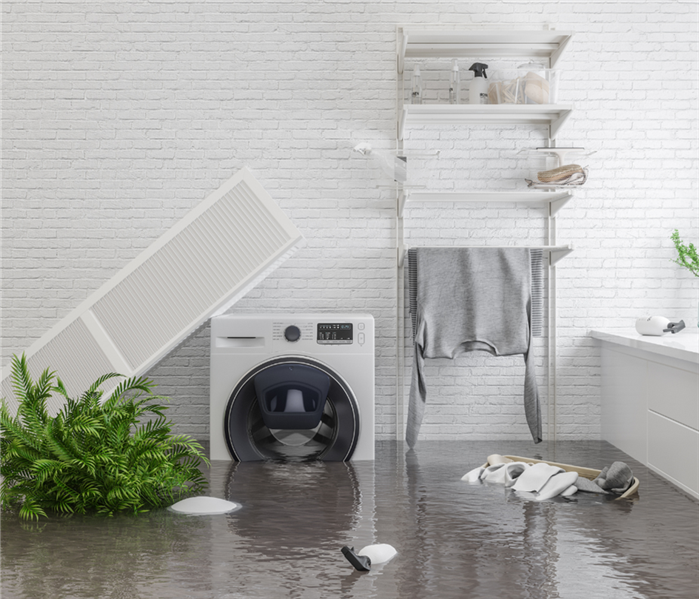 Don't let a mess like this cause you stress! Call SERVPRO today
Don't let a mess like this cause you stress! Call SERVPRO today
A flooded basement, a burst pipe, a clogged drain, or an appliance malfunction- all issues that can put a damper on the safety and usability of your residential or commercial property. Here are three tips to help you manage water damage-
1. Act quickly- Time is of the essence when dealing with water damage. The longer the water sits, the more damage it does. First and foremost make sure everyone in the house or building is safe and not near the water. Next, identify and promptly shut off the water source. Remove or unplug any nearby wet electronics. Mold can begin growing in as little as 24 hours so it’s important to act fast.
2. Assess the Extent of the Damage- Once you identify the source of the water, look to see what other areas are affected. It’s also advised to identify any potential hazards. This initial analysis will help SERVPRO Team McCabe to tailor a mitigation plan specific to your case and get you the best possible care and services possible.
3. Call SERVPRO® of Upper Bucks- 24/7 service is what we offer! Our phones will be answered at all hours of the day and qualified restoration experts are always on call. Our crew will be on-site as soon as possible to stabilize the situation and work with you to get your space back to normal!
The Scrooge Effect: Common Winter Complaints and How to Address Them
1/19/2024 (Permalink)
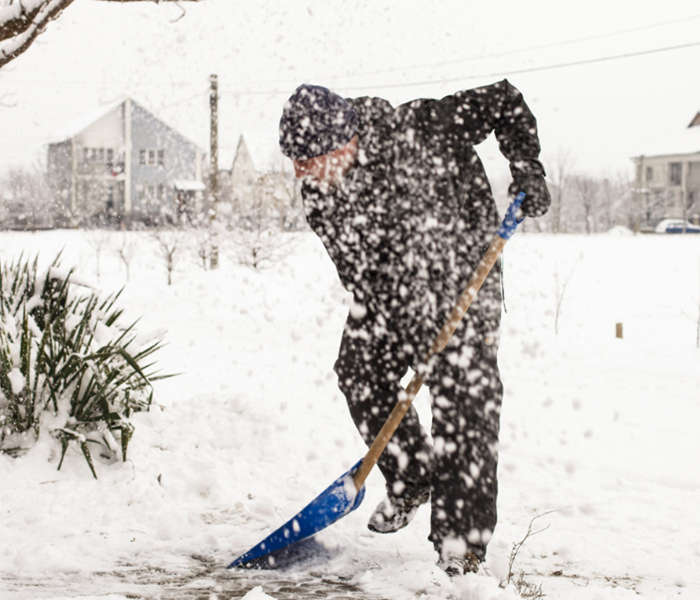 A safe winter requires preparedness!
A safe winter requires preparedness!
The holidays are the most wonderful time of year until they aren’t. Along with cold weather, wintertime can bring on an array of emotions and feelings. It’s important to be mindful of the wide realm of needs when addressing tenant concerns. Here are common issues tenants may bring to a landlord or property manager’s attention along with suggested approaches to take in response:
Snow removal – “Am I going to be able to park in my usual spot?” “Am I responsible for shoveling my own spot/sidewalk?” “What time are you going to clear the lot?” To calm concerned tenants, the person in charge must be proactive. If winter weather is in the forecast, send out an alert reiterating your snow removal policy. Even if your policy or related information is clearly marked in your rental agreement, it’s still a good idea to remind your tenants where to find that information when inclement weather rolls around. Communication is key. Your tenants want to know the protocol before the event of a snowstorm, not during.
Electricity – The power’s out, now what? This is a tricky issue to address as a timely resolution is typically out of your hands. The optimal course of action is to be in contact with your electric company often to ensure you’re getting the latest updates. If the power is out for an extended period, you may need to consider offering rent deductions and or hotel stay reimbursements. To avoid power outages completely investing in backup generators may be your safest bet. The upfront cost may be intimidating but it could save you money in the long run.
Dirty and slushy floors – This may seem like a minor issue but for some renters, this is the icing on the cake. A good way to reduce the slush is by doubling up on your doormats. Place a doormat outside your door to stomp off snow then place another immediately inside your doorway. Don’t forget to remind your tenants of basic housekeeping like wiping their feet before entering the building.
Reduced indoor air quality – It’s not just the weather outside that can be frightful, the air quality inside may be equally concerning. Colder and drier air traps pollutants making the air quality noticeably lower. HVAC inspections and regular heater and AC tune-ups can help you stay on top of your indoor air quality. While it doesn’t eliminate stale air, the circulation of air provided by ceiling fans can help dilute pollutants throughout a space for a short-term fix. It’s important to take air quality concerns seriously as they can lead to severe health issues if not addressed properly.
Heating issue – Temperatures may lower, but a tenant’s expectations will not. Legally, you must provide adequate heat in your tenants’ living spaces. Exact temperature requirements may depend on the local property maintenance codes. It’s important for both you and your tenants to understand and comply with your state’s heating regulations to best ensure a safe and habitable living environment. A simple step to take is to remind your tenants to not block heating vents. If you still come across a heating issue, make sure to reassure your tenant a solution is in the works and be ready to offer short-term solutions such as space heaters or alternative housing options.
Keep in mind each of these issues could quickly turn dire if not handled properly and may require legal advice to be dealt with. You don’t need to overwhelm your tenants with unnecessary updates however keeping them in the loop is crucial. Hopefully, these tips will make winter less frightful and more delightful for you and your tenants!
Fireplace Safety- 4 Mistakes to Avoid This Holiday Season
1/2/2024 (Permalink)
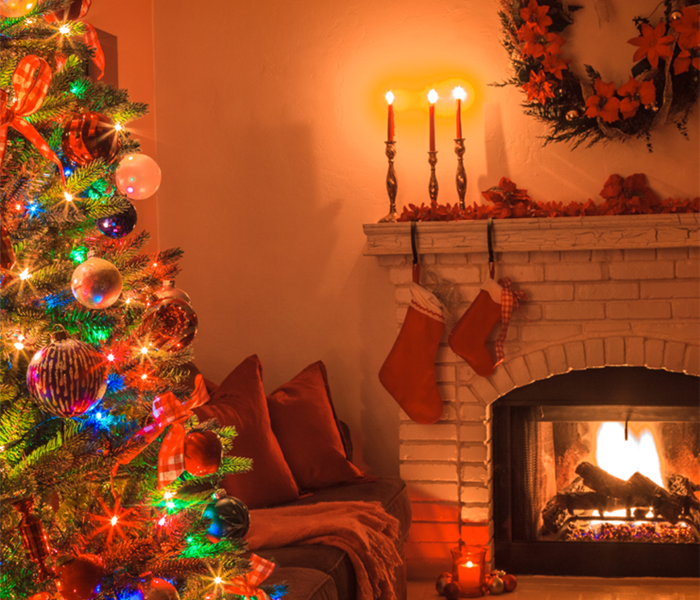 Our commitment to helping you create a safe and secure home extends beyond our restoration services.
Our commitment to helping you create a safe and secure home extends beyond our restoration services.
Stockings are hung, tree is lit, a Christmas movie is playing, cookies are being eaten- a fire in the fireplace is the last piece to tie this holiday scene together. However, when safety isn’t prioritized, this scene could quickly take a dark turn. Here are four components to your fireplace and mistakes to avoid with them-
- Firewood- Oak, ash, birch, hard maple, beech, hickory, pecan, dogwood, apple, and almond are all varieties of hardwoods that are acceptable for burning in your home. Any log that is covered with vines could be poison ivy- if that’s the case, the poison would release a dangerous irritant oil into the smoke. Green or unseasoned wood should also be avoided- as it can release harmful particles. Lastly, moldy or rotten wood simply will not release as much heat and therefore should be avoided too.
- The ashes- It’s recommended to leave a one-inch bed of ashes on the floor of a wood-burning fireplace but anything more than that needs to go. As it begins to build up, remove the excess ash regularly. To safely remove ashes, use a metal shovel and bucket. Make sure the ashes are fully cooled before throwing them away. Ashes can be thrown in the trash, added to an outdoor compost pile, or even repurposed. Some people use fireplace ashes in their gardens, make homemade cleaning remedies, or even polish silverware or fine jewelry.
- The flue-The component of your fireplace that protects your home from possible combustion from heat transfer is the flue. Although durable, the flue needs to be inspected regularly. Cracks and tears can allow unwanted drafts and moisture into your home and result in a steady drip down the chimney. A damaged flue can also allow creosote, a dangerous byproduct that comes from burning wood, to affect the masonry around your chimney and increase your risk of a chimney fire. An annual sweep should eliminate these hazards but regular inspections from the homeowner as an extra caution is advised.
- Fireplace doors-The most serious issue with fireplace doors is thermal shock breakage, which happens when there’s a major temperature difference across your doors’ surface. To avoid this, build your fires gradually and never pour cold water on hot ashes. In terms of the doors themselves, tempered glass, and ceramic glass help to promote hotter flames and prevent heat loss. Before closing, confirm your doors are specially designed to be shut with a fire burning, otherwise, the glass may shatter. Additionally, install a spark screen to protect your home from embers and sparks.
Remember a little precaution goes a long way! So as you gather around the warmth of your fireplace this holiday season, revisit this SERVPRO® checklist to make sure you’re not unintentionally inviting hazards to your home. From choosing the right firewood to maintaining your chimney flue, each component plays a crucial role in ensuring a safe and enjoyable experience.
What's that Smell?
11/10/2023 (Permalink)
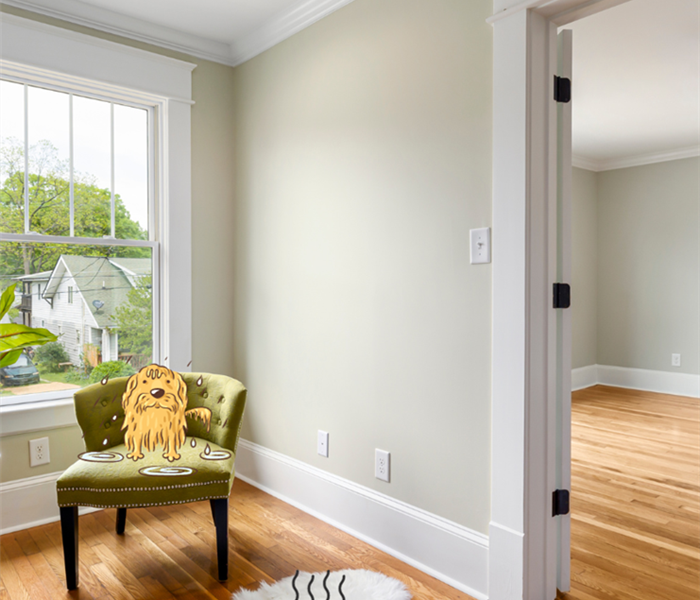 Your nose knows!
Your nose knows!
What’s that Smell?
When an unusual odor wafts through it’s a call-to-action, not a wait-and-see situation. It could be a benign issue like a clogged garbage disposal or a potentially hazardous problem that demands your attention. So explore, don’t ignore! Here are five weird smells and what they could mean:
- Fishy- Most people would never draw this connection but a fishy smell can be tied to an electrical issue such as frayed wires or faulty outlets. When an electrical component overheats, the heat-resistant chemicals covering the wires release that terrible fishy smell.
- Wet Dog- If you notice this smell and don’t have a dog the first thing you want to check for is mold/mildew growth. Bacterial growth in a damp area can often be the culprit for this smell. If you can’t pinpoint where the smell is coming from, it’s possible the odor is blowing from your HVAC unit and you may have a dirty air filter that needs to be cleaned. Excessive moisture is what’s causing this smell so if you don’t find evidence of mold check your appliances to see if you have any leaks causing rotting wood, as this issue can also effuse the “wet dog” smell. In a rare instance, if you ruled out all the above causes, you may have a rodent issue on your hand and should contact an exterminator.
- Pickle- A pickly or vinegary scent could mean formaldehyde, a potentially harmful chemical from adhesives and resins. When this chemical reaches room temperature it turns into a gas and when inhaled can cause serious medical problems. To remove this odor from your home open all windows and run fans to get the air moving. You can also sprinkle baking soda on any carpet or upholstery that seems to be emitting the smell, let it sit overnight, and vacuum it as a last step.
- Cat Urine- This distinctive smell could indicate black mold. If you find circular-shaped dark green, black, or brown spots that smell similar to cat urine you should call SERVPRO right away and we’ll send someone out to take a look. It’s advised to vacate the house but if you do not have that option try your best to seal off that area and avoid any contact with the affected region. If you or someone in your household is experiencing unusual respiratory issues, allergic reactions, or headaches it’s best to seek medical attention.
- Rotten Eggs- This smell isn’t just unpleasant; it could mean a serious gas leak, a worst-case scenario that poses a risk of fire or explosion if left undetected. Interestingly, natural gas is odorless. But gas companies deliberately add a foul-smelling odorant for safety reasons.
So trust your nose! Remember, your home’s smells are like messages, and addressing them quickly can prevent potential issues. And if you encounter a challenge beyond your expertise, don’t hesitate to reach out to SERVPRO®. We’re here to ensure your home stays not only clean but also safe. Trust us to handle the unexpected, so you can enjoy a worry-free home environment.
Fall Decorating 101: Safety Tips and Ideas for a Stunning Seasonal Display
10/13/2023 (Permalink)
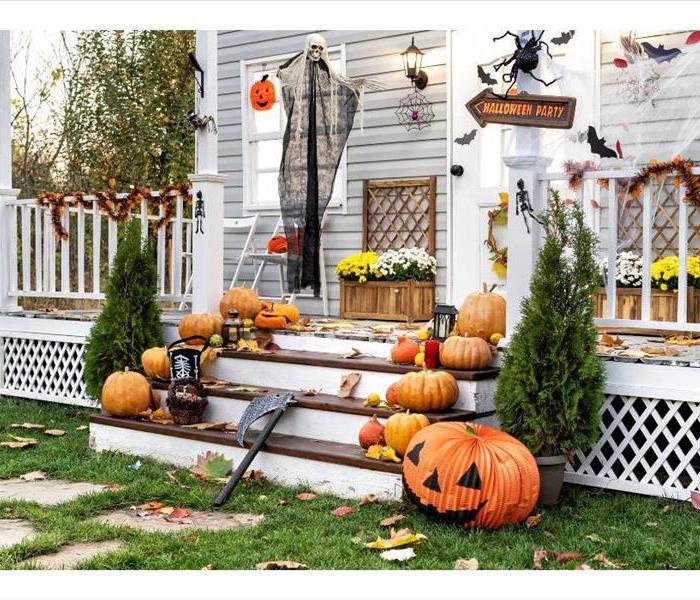 Stay safe with SERVPRO!
Stay safe with SERVPRO!
Decorating for the holidays is something millions of people do, but it can get extra spooky if you aren’t careful. There’s no need to shy away from pulling out all the bells and whistles for the holidays as long as you prioritize safety. Here are some tips to ensure your home remains secure throughout the holiday season:
Open Flames- Avoid them at all costs. Instead, consider using battery-operated or LED lights. There are even lights that can give you that same flickering effect you get from a real flame but without the danger!
Inflatables- Display with caution. Storing inflatables inside during severe weather offers the best protection.When you bring them indoors be sure to store them away from sources of ignition. When deciding where to put your inflatable outdoors, pick a spot with level ground and a good distance from any tree branches.
Outdoor lights- Double and triple-check that the lights you are using outdoors are actually designed to be used outdoors! Outdoor lights have a special coating that protects them from water damage. Always check the warning labels before you use any decoration with an electrical component outdoors. It’s best to unplug the lights before leaving your house as leaving them on unattended is a potential fire hazard.
Electrical Wires- Pinching cords in doors, windows, or under heavy furniture could damage the cord’s insulation. Never run electrical wires across driveways and/or walkways as it could become a tripping hazard and cause exposed wires and damaged sockets.
So next time you pull that box of decorations down and unravel those lights hopefully these safety tips spring to the forefront of your mind!
Is Your Home Feeling the Heat, Too?
9/8/2023 (Permalink)
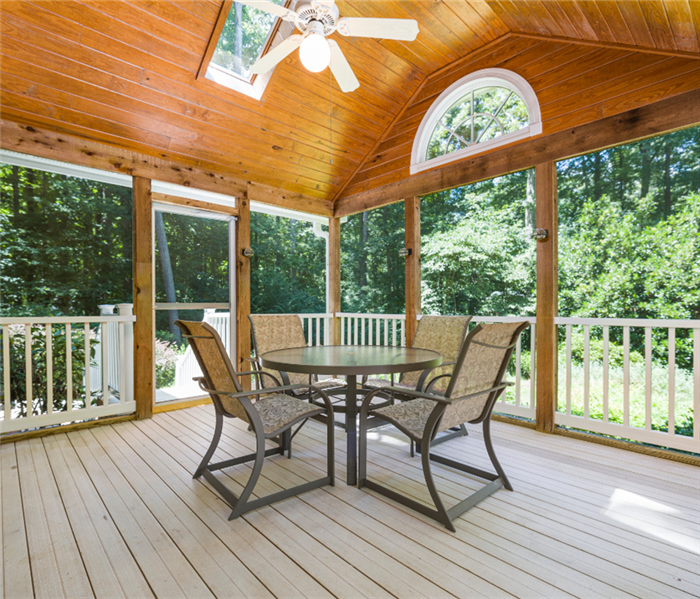 You and your house can beat surprise heatwaves!
You and your house can beat surprise heatwaves!
Excessive heat doesn’t only take a toll on you, but on your house too! When the temperatures rise, there are still ways to keep the costs low. Here’s what to watch for on hot days:
Plumbing- Most homeowners use 2-4 times more water in the summer than they do the rest of the year, that extreme increase can be hard for your plumbing system to handle! Extra water usage from sprinklers, swimming pools, garden houses, and even everyday water use can put high amounts of pressure on pipes so it’s best to confirm pipes are sealed properly before a heat wave comes through
Attics- Crawl into that crawlspace! Elevated temperatures and humidity in a poorly ventilated attic can create a breeding ground for mold.The best way to get hot air out of an attic is to add ventilation and insulation. Regularly inspect your attic to catch any signs of microbial growth or damage in its early stages.
Wooden fixtures/ material- Wood in your home is particularly susceptible to damage during hot, humid seasons. Even slight condensation on your windows can harm wooden window frames and internal walls. To protect any wood in your space you may want to consider installing energy-efficient windows, venting all appliances to the outside, and running exhaust fans while cooking or bathing. Did you know storing firewood indoors actually adds humidity to your house as the moisture dries out?
HVAC Systems: If you have the privilege of having one, your air conditioning system becomes your lifeline during a heatwave. However, when the outside temperature climbs to 95 degrees or higher, your AC may struggle to maintain a comfortable indoor temperature. Paradoxically, lowering your thermostat can make the air conditioner worker harder and less effective. To prepare, replace your air filters at least once a month. If your AC unit is 12 years or older, consider replacing it with a new model to keep you and your home happy!
How to Clean Your House to Set Your Family Up for a Successful School Year
8/11/2023 (Permalink)
You know the drill: hop in the car, go to your local Staples or Target and go through those back to school shopping lists! Grab that new lunchbox and backpack from the shelf and boom, you’re ready for the new academic year! What many people don’t realize is that school prep can and should begin a little closer to home-actually inside of the home!
They say a clean house is a happy house! Now, a clean house doesn’t guarantee happiness, but it sure can help boost your chances of feeling that way! As millions of families prepare for the 2023-24 school year, the basic step of organizing and cleaning your home is often overlooked. We have a few simple suggestions that will take minimum effort but will maximize your family’s school year success!
Laundry Room- Did you know SERVPRO offers washer and dryer maintenance? We can clean your vents and ducts to ensure safe washing and drying without risk of a fire. Dryers should be cleaned at least once a year, and every six months for heavier usage.
Clothing- For convenience sake, try to store your children’s clothing in a space that’s easily accessible to them which will hopefully increase the chances of them putting it away! Designate a spot or bin for dirty laundry to steer clear of the infamous dirty clothes mountains!
High Touch Zones- Knobs, handles, switches, remotes are all surfaces that get touched, but probably not cleaned, enough! Cleaning and disinfecting these bacteria heavy areas regularly will help keep the germs picked up from school out of the house.
Kitchen- Being an emergency disaster relief company, we want to first and foremost warn you of the danger of kitchen fires. Cleaning your kitchen and the appliances in it regularly are easy ways to keep your kitchen fire free.
Organization- Consider appointing certain areas in your kitchen as lunch and snack stations. You can store things like water bottles, containers, baggies, etc. all in proximity for easy school lunch prep.
Of course, the most vital part of making this school year count is not the tidiness of a house but the people who make it a home!
Fire Up the Grill, Not Your House: 7 Grill safety Tips Everyone Should Know
7/17/2023 (Permalink)
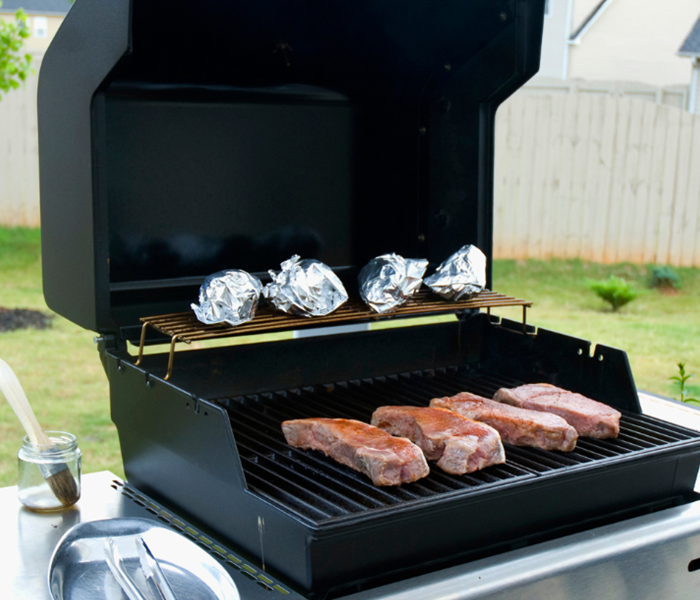 Stay safe this summer with these 7 grill tips
Stay safe this summer with these 7 grill tips
Gas grills are involved in an average of a little under 10,000 house fires each year, don’t let your house be one of them! Follow these steps to keep the fire on the grill and not in your house.
- Choose a safe location for your grill
Location is key! Right off of the house on the deck is a common spot to put a grill, but it isn’t a safe one! Grilling in close proximity to the house is a fire hazard. It’s a good rule of thumb to place your grill at least ten ft away from all structures. When choosing a spot make sure the surface is level and away from any overhanging branches and anything flammable.
- Keep a spray bottle on hand
When fat from whatever you’re cooking begins to drip, it’s common for the grill to flare up and cause a section of the grill to catch fire. Keep a spray bottle filled with water near your grill so you can quickly extinguish flames and prevent further spread.
- Never leave an in-use grill unattended
As goes for anything with flames, a lit grill requires constant supervision. It’s wise to stay close to the grill so you can easily see or smell signs of danger such as excessive smoke, flames shooting up higher than usual, or the scent of gas.
Strategically place your grill in a spot that is out of the way and not tempting for small children to go to. Enforcing the 3 foot “kid-free” is a great way to ensure safety and that no accidents occur.
- Clean your grill regularly
When not cleaned regularly, grease buildup on your grill can become a serious fire hazard. It’s a good idea to clean your grill with a grill brush after each time you use it and empty the grease tray as soon as you notice it filling up.
- Store propane tanks away from your house
Keep propane tanks outdoors in a well-ventilated area. To ensure safety, always keep the tank upright and check the valves are turned off fully.
Closed-toed shoes, oven mitts, and an apron are good protective measures to wear. Avoid loose-fitting clothing, dangling jewelry, and tie your hair back if it is long.



 24/7 Emergency Service
24/7 Emergency Service








